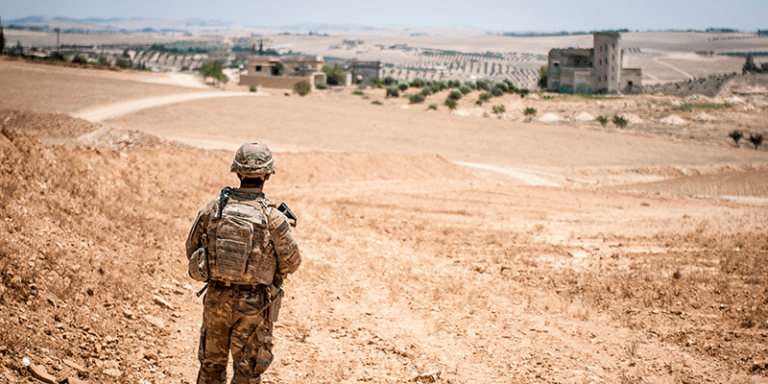
Criticism of President Donald Trump’s abrupt decision to withdraw American troops from Syria continues to inform commentary on the US role in the country. One thing is sure, however: the decision helps to explain the way the president deals with important foreign policy and national security issues involving the interests of the United States as well as those of other regional and international actors. Regarding Syria, President Trump’s decision indicates that he has decided to abandon whatever influence the United States has cultivated there in favor of letting the Syrian regime, Russia, Turkey, and Iran chart what is likely to be the country’s fractious future.
A Decision Long in Coming
The president had declared his intention more than six months ago to withdraw American troops from Syria, which he characterized as a campaign promise, but his national security team at the time––Secretary of Defense James Mattis, Secretary of State Mike Pompeo, and National Security Advisor John Bolton––cautioned against it. They insisted that the United States still had three objectives in the country: eradicating the so-called Islamic State (IS), forcing the withdrawal of Iranian troops and Iran-supported militias, and assuring stability after a political process and transition. The surprise decision thus came to contradict that rationale and the advice of the administration’s special representative to Syria, James Jeffrey, and Special Presidential Envoy for the Global Coalition to Counter ISIS, Brett McGurk. Incidentally, Mattis and McGurk left their posts in protest against the president’s decision, effective as of the beginning of January.
Needless to say, Trump’s decision to leave Syria has again shown his penchant for isolationist policies. Despite increasing the defense budget to unprecedented levels, his overarching wish is to limit the American military presence in strategically important areas around the world, such as the Middle East, Europe, and East Asia. What is intriguing is that Trump’s decision about Syria comes while IS still controls significant pockets of the country and the tension with Russia continues. By contrast, the president did not announce any withdrawal from Iraq where the United States deploys a contingent of 5,200 soldiers. It is notable that Iraq is a country that now enjoys a relatively stable government friendly to the United States and where important successes have been achieved against IS.
What is intriguing is that Trump’s decision about Syria comes while IS still controls significant pockets of the country and the tension with Russia continues.
What is arguably the case is that despite the complexities of the Syrian conflict, the withdrawal decision is intimately linked to the president’s relationship with Russia, which maintains military bases in Syria and had repeatedly demanded that American troops leave that country. In fact, it is unlikely that any insights into this relationship will be forthcoming before the conclusion of the investigation led by Special Counsel Robert Mueller.
Impacts All Around
With Trump’s decision made, the questions at this juncture relate to its impact on actors at the Syrian front and on who will fill the vacuum left by the American troops, who are departing from areas rich in hydrocarbon resources and ones that strategically adjoin Iraq’s northwestern border.
First, the biggest impact of the decision will likely be on the Syrian Democratic Forces (SDF) that were trained and equipped by the United States for the war against the Islamic State. Composed mainly of Kurdish fighters, these forces lack the popular legitimacy necessary in the areas they control, which are mainly Syrian Arab. In the absence of American troops, these will find their position untenable, especially considering Turkey’s insistence on their disarmament and departure from Syria. What adds to their predicament is the obvious American-Turkish coordination and cooperation, which were evident in the telephone conversation between President Trump and Turkish President Recep Tayyip Erdoğan prior to the decision. Without Americans working to protect their fortunes, SDF troops may not have much capability to resist Turkish forces; they may even have to surrender their American-supplied heavy weapons as a condition for Turkey to continue to fight IS in the region.
In the absence of American troops, the Syrian Democratic Forces will find their position untenable, especially considering Turkey’s insistence on their disarmament and departure from Syria.
An important consideration here is how much of the area where the SDF operates are Turkish forces able to control. The Turkish position on this matter is still unclear. What is known is that the territory is very large and controlling it would require the costly deployment of a large contingent of troops and their equipment. In addition, funds are needed for running local government and supporting infrastructural and social development to serve tens of thousands of repatriated civilians, especially in the city of Raqqa that has been largely leveled by American aerial bombardment in the fight against IS.
Second, there is no escaping the question of what Russia prefers to happen and whether it would be satisfied with a mere American withdrawal, as Washington and Ankara appear to be coordinating their moves. Thus far, there does not seem to be similar American-Russian cooperation on the withdrawal issue, at least publicly, but Russia looks to Syria’s hydrocarbon resources as a prize for its heavy military involvement in the country. That, at least, could be gleaned from Russian President Vladimir Putin’s gleeful reaction after Trump’s decision. What is also possible is that Russia and Turkey could strike a deal by which they would share filling the vacuum in eastern and northeastern Syria as well as the Syrian desert. Russian companies are already preparing to extract Syrian gas from these areas, an indication that Russia and Turkey may be the biggest beneficiaries from inheriting the areas previously controlled by US forces.
Russian companies are already preparing to extract Syrian gas from these areas, an indication that Russia and Turkey may be the biggest beneficiaries from inheriting the areas previously controlled by US forces.
Third, Syrian President Bashar al-Assad is likely to emerge victorious by nominally reclaiming the lands Russia will control after the American withdrawal. Assad would, nonetheless, remain weak; as it is, he can hardly leave Damascus as his regime suffers from a collapsed economy that cannot fund the needed reconstruction project. And despite scenes of Arab embraces, the latest of which were the visit by Sudanese President Omar al-Bashir to Damascus and the United Arab Emirates’ decision to reopen its embassy there, Assad is unlikely to recapture his pre-war role or stature in the Arab world. Neither is he likely to overcome the isolation imposed on him by western powers because of the massacres he committed against his own people.
Indeed, outside actors’ negotiations regarding inheriting Syrian territories are a direct result of the failure of the centralized Syrian state to hold on to the territories over the last seven years of civil war. Assad also failed to assure the unity of the Syrian people, millions of whom are either internally displaced or live as refugees abroad. The Syrian opposition that is allied with Turkey today, especially that under the banner of the Free Syrian Army (FSA) which liberated border areas from the Kurdish People’s Protection Units (YPG), still considers Assad to be its top adversary. The FSA is willing and able to maintain its grip over areas it now controls with Turkish help if the price of the American withdrawal is to turn it over to the Syrian regime.
The Syrian opposition that is allied with Turkey today, especially that under the banner of the Free Syrian Army which liberated border areas from the Kurdish People’s Protection Units (YPG), still considers Assad to be its top adversary.
It is thus possible that, in the long term, Syria will be divided into different areas. Some of these will be under Assad’s control but with Russian guardianship, where many Iran-supported militias can operate. Other areas will be under the opposition’s control but with Turkish guardianship, as the Kurds lose their grip over the areas they governed with American assistance. This will mean that the desired political solution to the Syrian conflict, one that would include a real transition from authoritarianism, is far from becoming a reality. In fact, the changes in territorial control are more a reflection of the interests of regional and international actors than a drive to arrive at the vaunted political solution. Trump’s decision thus is only another expression of this dynamic that reflects both the president’s understanding of American interests in Syria and his desire to retrench back into the United States. In the process, he hopes that others would pick up the fight to eradicate the Islamic State’s menace and pay the costs of Syria’s reconstruction (the latter, he announced, would be Saudi Arabia).
Additionally, Trump’s decision on Syria points to serious challenges to his administration’s own pronouncements about what the United States wanted to do in Syria: confront Iran, face up to Hezbollah, and help in forging a political transition. All those who enunciated these policy objectives––Mattis, Pompeo, and Jeffrey, among others––have been humbled and embarrassed. Furthermore, Trump’s decision puts the United States in an untenable position vis-à-vis its allies in the region and sends a message that it is not a reliable partner. This was evident in the criticism leveled by French President Emmanuel Macron, whose forces perform a similar function to American forces in Syria.
Withdrawing from Syria has wider implications for the Middle East, an area where an authoritarian Russia that has participated in the slaughter of Syrian civilians sees itself on the cusp of replacing the United States as a power in the region.
Finally, withdrawing from Syria has wider implications for the Middle East, an area where an authoritarian Russia that has participated in the slaughter of Syrian civilians sees itself on the cusp of replacing the United States as a power in the region. A Russian condominium there means not only the continuation of Bashar al-Assad’s oppressive regime—one that escapes accountability and the rule of law—but also the renewed imposition of authoritarianism everywhere.
The overall message that must be understood by Syrians and Arabs looking for a democratic political order and working to assure respect for human rights is that their struggle must depend on self-sufficiency and hard work. Reliance on the United States under Trump is folly because what concerns him is only what enriches American coffers. He is a businessman trading in American values for financial gain. To him, Syria is a losing venture and withdrawing from the conflict there is more rewarding than defending enduring values that undergird international law but that mean nothing to the current American president.

